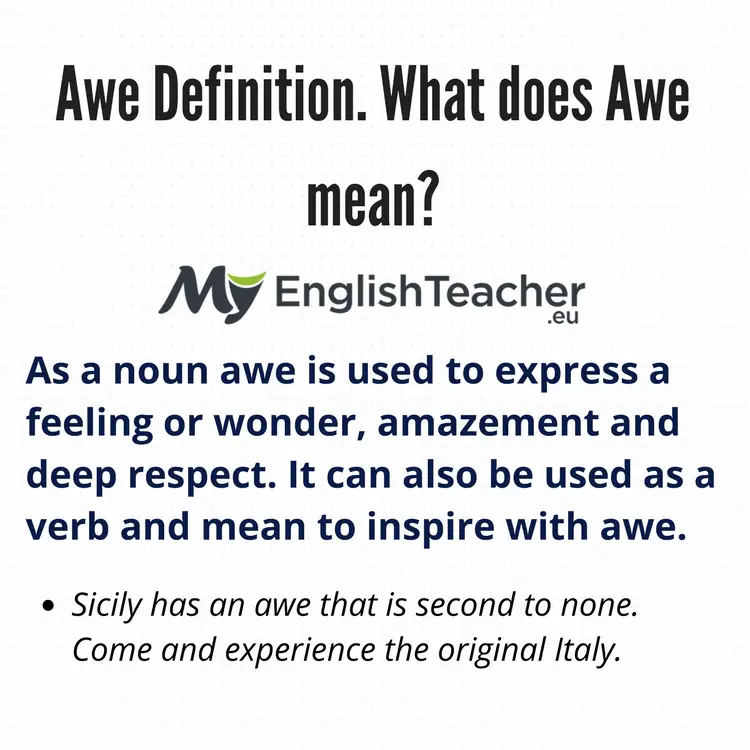The word awe is a single syllable word but don’t let that fool you as to its power. The origins of this word date back to the 13th century from the Scandinavian term “agi” which means “fright.” Later in the early 1800’s the term took on more of a meaning reverence and admiration. Today, the word awe is frequently used in advertisements and is one of the 10,000 most common words used in the English language.
Meaning of Awe:
As a noun awe is used to express a feeling or wonder, amazement and deep respect. It can also be used as a verb and mean to inspire with awe.
- Sicily has an awe that is second to none. Come and experience the original Italy.
- The concert was amazing and it awed me to my core.
Dialog:
Francis: Hey, what did you think of the tour?
Paul: It was amazing, I was awed by the size of the structures.
Francis: Yeah, the artifacts also have an awe about them and to think of how many millions of years old they are.
Paul: Yep. It was an unforgettable trip and awe inspiring.
Francis: Absolutely, awe is the best way to describe it.
Related Phrases & Phrasal Verbs:
Something else – when use the phrase something else in the context of awe, we saying that someone or something is exceptional.
- I was awed by his speech, he is something else!
Make an impression – the use of make an impression in the context of awe, means to impress someone.
- That book made more than an impression on me, it was simple awe inspiring.
Make a splash – the use of make a splash is to do or say something at attracts a lot of attention. In the context of awe, it would be positive attention.
Blow away – to blow someone away is to impress someone or be very impressed.
- I was blown away and filled with awe as I looked at the Northern lights.
Knock out – often times we use this phrase, knocked out, to say that something or someone is very attractive and impressive.
- She was an absolute knock out tonight I was standing in awe of her when she walked in the room.
Taken aback – when we use taken aback in the context of awe, we are saying that someone is astonished and amazed.
- She was taken aback when she walked out onto the roof and stood in awe as she looked at the moonlight and the stars that danced in the sky.
Leave one-open mouthed – if someone is looking open mouthed it means something has caused them to be shocked or extremely excited and amazed.
- I was left opened mouthed by his comment and awed by the way was able to explain his reasoning for his decision.
Related idioms:
One for the books – when we use this phrase in the context of awe, we are saying something is extraordinary or remarkable.
This is one for the books, I stand in awe with his leadership and how he has handled this crisis.
Strike dumb – in the context of awe, we use this to express when someone is unable to speak because of shock and amazement.
- I was struck dumb by how kind she was and was awed and moved by her compassion.
Razzle-Dazzle – this is a phrase that is often used to express something that is impressive.
- I was awed by all the razzle-dazzle of the stage show.
Take one’s breath – this is a phrase we use to describe something or someone that is so amazing that we almost stop.
- I was inspired with awe and her beauty took my breath away.
Knock one’s socks off – we use this to when we describe something or someone that amazes or impresses someone.
- The fans were filled with awe and the performance knocked their socks off.
Blow one’s mind – an experience that is overwhelmingly astonishing.
- Watching the launch of the space shuttle was mind blowing and I stood in awe as it disappeared into the sky.
Collocations:
To inspire with awe
Stand in awe of
To be filled with awe
Synonyms (other ways to say):
Amazement (noun)
Amazed (verb)



























